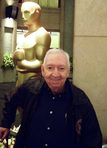Jack Fitzgerald's Blog, page 5
February 25, 2016
Idle Chatter
This past weekend I attended a memorial for a good friend’s sister, who passed away late last year. It seems these days I attend a steady stream of memorials. When I was younger, I didn’t even know what a memorial was but now that I am in Act III of my life, people seem to be leaving at an alarming rate.
One thing that amazes me is how well organized these memorials are. They follow a pattern though. People arrive and give actual kisses or air kisses while remarking on how long it has been since they have seen one another. I simply count the number of walkers and canes among the attendees. (I joined that illustrious group this year with my spiffy new four-wheeled, fire-engine-red walker with built in seat and little basket for do dads.)
Most memorials are catered affairs as was this one I just attended. Fresh flowers were on each table and caterers passed out drinks and hors d’oeuvres. That is the time that general chitchat starts in full force. Some of these people you don’t know or they’ve changed so much since you last saw them that they are like meeting a new person.
Next you and your fellows chitchatters come to attention as the host or close loved one makes some opening remarks. Photos of the deceased person are placed around strategically and their presence is strongly felt. Some overall statements are made about the loved one and their contribution to society. This is an emotional moment for all and rightly so as actually this get together is where you officially say farewell to the honoree. Today’s opening remarks were made my friend about his sister, who was the center of the celebration. He spoke, his partner spoke, his older brother spoke and then a family friend invoked the breaking of the bread—a Jewish tradition at times like this. It was a very nice remembrance and everyone realized how much this person was missed.
Then the caterers do their thing and serve all sorts of excellent food. Today’s was a Thanksgiving dinner with all the trimmings. We found a table at which to seat ourselves and then is when the serious chitchat gets started. You either catch up with the doings of people you know or learn a lot about people you are meeting for the first time. It’s really a jolly time with not a scintilla of moroseness.
Then after the meal, the host reconvenes the group and it is now time for the Act III of the memorial to begin. At this stage, everyone is encouraged to tell their favorite story in which the deceased was involved. This can be quite interesting and can provide you with a lot of things possibly to include in your next book or screenplay or short story or play. It is at times like this that I listen with both ears.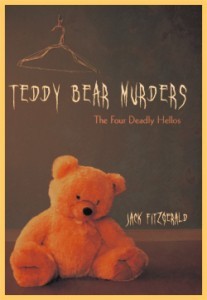 Each episode a person relates has a beginning, middle and end—and the end is usually an unexpected little piece of mirth. So, it’s an excellent time to pay attention. I generally listen and don’t talk. This is the really interesting part of these memorials and, as I say, it’s the point where a writer should listen attentively. I can’t tell you how much idle chitchat from memorials and other social gatherings I used when writing my two murder mysteries: TEDDY BEAR MURDERS and MURDER IMPOSSIBLE. In mystery writing, you find yourself having a great need for fillers of all sorts—and that’s where idle chitchat you’ve indulged in will come to your rescue.
Each episode a person relates has a beginning, middle and end—and the end is usually an unexpected little piece of mirth. So, it’s an excellent time to pay attention. I generally listen and don’t talk. This is the really interesting part of these memorials and, as I say, it’s the point where a writer should listen attentively. I can’t tell you how much idle chitchat from memorials and other social gatherings I used when writing my two murder mysteries: TEDDY BEAR MURDERS and MURDER IMPOSSIBLE. In mystery writing, you find yourself having a great need for fillers of all sorts—and that’s where idle chitchat you’ve indulged in will come to your rescue.
I mentioned two chat sessions at memorials: the first is when you arrive and the second is while you are eating. That’s where the questions flow nonstop. I have always found that the way to ward off inquiries is to ask other people questions. In other words, you beat them to the punch.
One thing is for sure with new people you meet. They want to know what you do or did for a living. I don’t mind that too much because once I tell them I’m a writer, they begin giving me the third degree. “Are you famous? Have you written anything I would know?” What kind of writing do you do?” That is when I start selling books.
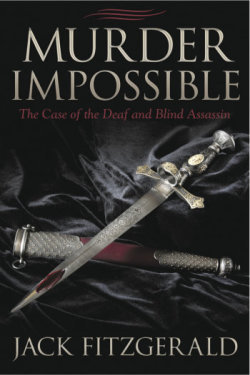 Today I think I sold a dozen copies. I told them to go to my website at www.jackfitzgerald.com and they could find out all about my background in writing plus read my numerous blogs. I try not to be crass in the process or too obvious that I am pushing books. Thank goodness my friend had a copy of several of my books to show people. I’ve learned one thing, though, if you plan on hawking your books you must be quick at it. Make your statements brief but swift and then get on to something else. Playing “moi” is very short lived.
Today I think I sold a dozen copies. I told them to go to my website at www.jackfitzgerald.com and they could find out all about my background in writing plus read my numerous blogs. I try not to be crass in the process or too obvious that I am pushing books. Thank goodness my friend had a copy of several of my books to show people. I’ve learned one thing, though, if you plan on hawking your books you must be quick at it. Make your statements brief but swift and then get on to something else. Playing “moi” is very short lived.
Here is an example of the “something else.” A good friend and his partner whom I only see on rare occasions looked at me and remarked that my face looked younger than when he first met me. He wondered what my secret was. I told him I had a niece who was a dermatologist and I’d have to give her the credit.
One very friendly lady told me that she had wanted to be a writer but it just never happened for her. She wanted to know how it was that I could just sit down and write a book and there it was for someone to buy on www.amazon.com. I told her that the reason most books don’t get written is because people talk about them rather than writing them. I told her I rarely tell anyone that I am writing a book until it’s finished and about to be published. Up until that point, any talk you do about your book and its plot diminishes the energy you have to put into the book itself.
So, my friend’s memorial for his sister was another wonderful get together celebrating the life of a very nice and very missed productive person. We all should be so lucky as to have a memorial when our time comes. But, while you’re still up and about and attending them, keep your ears open. You’ll be surprised at how much food for thought you’ll hear.
February 18, 2016
Access: It’s Who You Know
Breaking into writing (meaning getting paid) or crashing the gates of Hollywood or bettering your lot in life takes access. In other words, getting ahead in life boils down to “who you know.”
We’ve all heard the story of how the movie star Lana Turner was discovered at the soda counter of Schwab’s Drug Store in Hollywood. Somebody is supposed to have walked up to her and said, “I can make you a star.” Supposedly the same thing happened to Rock Hudson and dozens of others. So goes that serendipity factor in our lives.
The examples of Lana and Rock belong to the past. Nowadays there isn’t a counter at Schwab’s in Hollywood. The building was torn down thirty years ago and no replacement venues have sprung up to help the desperate would-be writers and actors.
 Access these days mainly costs money, not luck. Would-be writers and actors are subject to pay to join workshops, writing contests, or online seminars. In other words, access to fame is something you must be ready to pay for these days. If you buy any of the books listing agents, you’ll see that each and every one of them is charging people access fees via workshops.
Access these days mainly costs money, not luck. Would-be writers and actors are subject to pay to join workshops, writing contests, or online seminars. In other words, access to fame is something you must be ready to pay for these days. If you buy any of the books listing agents, you’ll see that each and every one of them is charging people access fees via workshops.
Then there are the Internet lists—like The Black List. You can pay them monthly to list your screenplay along with a log line (twenty-five words or less synopsis.) For coverage (meaning a mini-review of your work) the price goes up considerably. Contests are raging too. Both of these access venues cost money and guarantee nothing except more than likely you are going to go broke promoting yourself.
I’d say these days you’d do much better to buy a ticket to Southern California or New York, join an Alcohol Anonymous group in Hollywood, Beverly Hills, Malibu or New York City and make friends with successful former alkies. You could do just the opposite. Hang out in fashionable water holes such as the Polo Lounge, Wolfgang Puck’s, Sardi’s, The Russian Tea Room, etc. and buy people drinks. Your chances are infinitely better than paying The Black List a fee or joining a workshop or entering one of the many contests. In all of these, you are merely joining thousands of other frantic would-bes in trying to win access.
Remember, the days are practically gone where you can sit at a soda fountain and expect Dame Fortune to send one of her knights to rescue you from ignominy. So the very few spots that still exist like I mentioned in the preceding paragraph are much more rewarding than a workshop or contest or a fee for listing.
In the past, we tended to let fate make our decisions for us. In the present, we try to force fate to make our decisions for us by paying up front.
This comes around to me. How did I ever get any money out of writing and a somewhat decent reputation as a writer? I touched on that in my last blog about serendipity but I didn’t tell the whole story.
I would now like to expand on last week’s narrative and dub this present blog’s particular piece of luck Serendipity Part II.
In Serendipity Part I, I went to a stage production in New York and was inspired to write my play TIJUANA LADY. Good things happened to me as a result of that bit of luck. But there is more to the story. Much more.
 TIJUANA LADY is about a porn star named Clytee de Khunt, who goes home for her father’s funeral. When I wrote the play, I wondered if the audience would believe that the main character was a film star, even an X-rated one. I wasn’t convinced they would be. In order to add a dash of supposed stardom to Clytee’s persona, I wrote a five-minute prologue that was to be the preview of a new porn movie called TIJUANA LADY. In other words, the audience would arrive and a movie screen would be on stage. The lights dimmed and our short film thrashed out the celebrated tale of the donkey and the lady in a seedy Tijuana bordello. The preview ended and the movie screen disappeared. The lights came up on the living room of a homey residence in Rosedale, Arkansas. The play began.
TIJUANA LADY is about a porn star named Clytee de Khunt, who goes home for her father’s funeral. When I wrote the play, I wondered if the audience would believe that the main character was a film star, even an X-rated one. I wasn’t convinced they would be. In order to add a dash of supposed stardom to Clytee’s persona, I wrote a five-minute prologue that was to be the preview of a new porn movie called TIJUANA LADY. In other words, the audience would arrive and a movie screen would be on stage. The lights dimmed and our short film thrashed out the celebrated tale of the donkey and the lady in a seedy Tijuana bordello. The preview ended and the movie screen disappeared. The lights came up on the living room of a homey residence in Rosedale, Arkansas. The play began.
Everybody at the Paris English Theatre thought the preview was a neat idea but no one had the slightest idea on how we were going to do the film. I was about to give up on the idea as being impossible as well as improbable when Serendipity Part II arrived out of nowhere. I was shopping for vegetables and fruit at an outdoor market one Saturday and who walked up but Thomas Quinn Curtis, the film and TV critic for the International Herald Tribune, the Paris outlet for The New York Times. He had reviewed an earlier play of mine NEWS FROM FREIDA and given it a good critique.
I gathered all the nerve I had and went up to him and said hello. I refreshed his memory as to whom I was. He seemed pleased and to my surprise invited me to come over to his apartment for tea. He said he was interested in my career as a playwright. We agreed that I would visit him a couple of days later.
I went to his apartment, which was located under the famed restaurant TOUR D’ARGENT. To say he lived in a splendid apartment would be putting it mildly. He had a big picture window looking out on the River Seine. The place was unusually large as far as apartments go in Paris. He ordered tea and pastries from the restaurant to be served to us. I couldn’t believe I was there and was somewhat tongue tied in his presence.
He asked me what project I was working on and I told him TIJUANA LADY. I gave him a rundown of the play and then mentioned the idea of the film. He thought it was a capital idea. I told him I had no idea how I was going to pull it off. He laughed and said he thought he might be able to help me. He got on the phone and called Giuseppe Hibler, who was the last companion of the internationally celebrated film director Luchino Visconte (DEATH IN VENICE, etc.)
Giuseppe came over that very afternoon. He was fascinated by the idea of an ersatz porno preview. He got a friend of his, Wallace Potts, a porn filmmaker and partner to Rudolph Nureyev, interested in the project. Giuseppe arranged for me to meet Wallace’s good friend, Nestor Almendros, an Oscar winning cinematographer. Before I knew it, the film became a reality with Wallace, Giuseppe, Rudolph, Nestor and a lot of their friends helping out. They did a masterful job and of course brought a lot of attention to TIJUANA LADY. The preview was a real hit. When Clytee appeared on stage, the audience was convinced they were seeing a real porno star and many nights applauded her entrance.
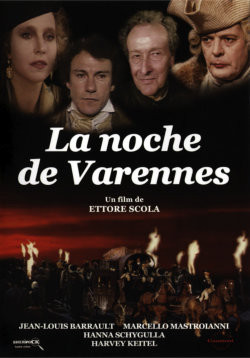 From knowing all these people, I soon was invited to go with them to the Cannes Film Festival. Through their help, I wrote the original storylines of two films: BEETHOVEN’S NEPHEW and a French Film that became known as LA NUIT DE VARENNES (That Night in Varennes.) From my work on those projects, I was hired to go to Hollywood to work on a screenplay—and thus begin my career as a writer for hire. Serendipity, I should say.
From knowing all these people, I soon was invited to go with them to the Cannes Film Festival. Through their help, I wrote the original storylines of two films: BEETHOVEN’S NEPHEW and a French Film that became known as LA NUIT DE VARENNES (That Night in Varennes.) From my work on those projects, I was hired to go to Hollywood to work on a screenplay—and thus begin my career as a writer for hire. Serendipity, I should say.
If you are interested in reading my play TIJUANA LADY, you can go to Amazon.com or Barnes and Noble and order PARIS PLAYS. This is an anthology (and autobiography) of my ten years in Paris, the founding of the Paris English Theatre and copies of all 9 of my plays that were produced there—including of course TIJUANA LADY.
I hope some of you still believe in the power of serendipity over paid access. I think serendipity is still alive, but it is just having a hard time of it these days.
February 11, 2016
Serendipity: A Fortunate Happenstance
When I lived, worked and wrote in Paris for ten years, I used to take charter flights back to the States for economic reasons. One such occasion was when my father had a serious stroke and I was called home. Charter flights were cheap and were for sure the best way for a person on a seriously tight budget to get back to the USA. My plan for getting home to Okolona, Mississippi, was to take a charter to New York and from there a Greyhound bus the rest of the way. Decidedly it was not the deluxe way of getting to my hometown but it was the cheapest.
My father was very ill and I knew it probably was the last time I would see him. I quickly booked a charter and was in Okolona several days later. My family and I had a great visit and my father seemed to improve while I was home. The time soon came though when it was time to return to my teaching (and writing) activities in Paris. I put writing in parenthesis because I had not yet entered the realm of being a full-fledged writer.
I went to the airport in New York to catch my charter flight back to Paris but was told it had been delayed a day. They put me up in a modest hotel in the city for the night. Now comes the part serendipity played in my life. If that flight had taken off as scheduled, I would have returned to Paris and continued my teaching activities and my struggling to get a hold in the world of writing.
The flight though didn’t take off as planned and my life was changed forever. That layover provided me with a future in writing.

Divine
That evening in New York I decided not to stay in the hotel room and watch TV but instead to go out and scout the neighborhood. In my wanderings, I ran into a theater that was presenting a production of the notorious underground film star Divine in a theatrical piece called WOMEN BEHIND BARS. Divine was a three-hundred-pound man in drag. The show was hilarious. I had a great time and was in a great mood afterwards.
The next day on the charter plane my mind thought of the play I had seen the night before. Being that I had just returned from a situation where I knew my father would not survive, my mind was on both the play and him. Out of nowhere I began thinking of Divine going home to attend her father’s funeral. In the plot hatching in my brain, I decided a drag queen would not be welcomed dressed as a woman. He would out of respect dress normally as a man. Therefore, I decided to add the twist that my main character had had a sex change.

Tijuana Lady
By the time the plane landed in Paris, I had a play composed in my head. I even had a name for it — TIJUANA LADY. Immediately upon returning to my apartment in Paris, I began committing my play to paper. I think it took me less than a week to bang it out on my little Olivetti portable typewriter. My story involved a porno star who had had a sex change. Her father died and she went back to her small hometown in Arkansas for his funeral. The play turned out not only funny but contained a lot of human comedy.
Within a very short time, the theater group I had founded in Paris was mounting a production of TIJUANA LADY. We had a wonderful cast and the production was a big success with sold-out audiences every night. A British film producer who attended even optioned it for a film.
All of a sudden I was considered an expert on “sex changes.” A group from UNESCO’s headquarters invited me as a guest speaker on the subject. That took more creativity than writing the play. I really knew nothing about sex changes. I had simply written what I imagined—mainly based on having read about Christine Jorgenson, a famous transsexual who was a sensation when she retuned to her native USA after having sex-change surgery in Denmark in the mid 1950s.
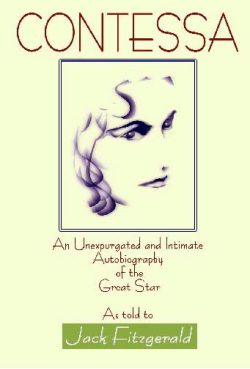
Cover of Jack’s book CONTESSA.
Flash forward to when I retuned from France to the States to live and work in Los Angeles as a writer. I wrote screenplays and was considered a pretty successful “writer for hire.” A theater group in Los Angeles put on TIJUANA LADY, with Rita Hayworth’s nephew Richard Cansino playing the leading role. Again the play was quite a success. I began thinking about perhaps someday turning the play into a novel. Several years later when I retired to Palm Springs, one of the first things I did was to adapt the play into a novel which I called CONTESSA. It published up at 529 pages, a pretty long book.
I did a lot of research for my book. I spoke with many transsexuals or corresponded with them on the Internet. The one thing they all seem to want was a sympathetic character—not a comedic or caricature but someone you could root for and like. This approach was totally different from the play. Even so, I honored their desire for an upbeat character and that is exactly who the final leading person ended up being.
The book was published in 2000 and since then has had what I consider a good success. It has been under option six times for a film but so far the magic lightening has not struck that would turn it into a movie. The book is not turgid in the least and is a fast and exciting read. The last third of the book takes place in Cuba during the revolution. Being that I lived in Cuba during those turbulent times, it was easy for me to incorporate that most wonderful city Havana. The book is full of humor, adventure and fun. It is available on Amazon, Barnes and Noble –but not at your local movie theater.
This brings me to last week when I went to see a film called THE DANISH GIRL. This is a 2015 British film based on a book that came out in 2000 (same year as CONTESSA) about the lives of two real people in the 1920s—Einar Wegener (after becoming a woman, she was called Lili Elbe) and Gerda Wegener, two Danish painters who were actually man and wife. They ended up living in Paris and that is where Einar became Lili. Lili was operated on but the doctor tried to transplant a uterus in her so she could bear children. It didn’t work and she suffered a disastrous consequence.
In my research for CONTESSA, I ran across these two people but they did not fit the uplifting and positive character that the transsexuals had asked me to use as the centerpiece of any novel I was going to write about gender reassignment.
 The plot point that may have caused THE DANISH GIRL to have more success than CONTESSA was the fact that the story was based on true characters. It also concerned one of the first surgeries to correct gender. The book showed that during the 1920s such people were usually labeled insane and spent their lives in confinement or had electric shock and lobotomies performed on them.
The plot point that may have caused THE DANISH GIRL to have more success than CONTESSA was the fact that the story was based on true characters. It also concerned one of the first surgeries to correct gender. The book showed that during the 1920s such people were usually labeled insane and spent their lives in confinement or had electric shock and lobotomies performed on them.
I must confess that I was a tad jealous when I was viewing THE DANISH GIRL because its author saw his work make it to the screen and my CONTESSA hasn’t. The film stars Eddie Redmayne as Lili and he does a remarkable job. Overall the film is quite good and I think you will like it
I would be very pleased though if you would check out CONTESSA and especially if you know someone you could recommend it to who wants a good base story for a film. The full name of my book is CONTESSA: An Unexpurgated and Intimate Autobiography of the Great Star as told to Jack Fitzgerald. It is written as though the person were real. Many people who have read CONTESSA think she is an actual person. I do hope you will check CONTESSA out on Amazon or Barnes and Noble or order it at your favorite bookstore.
January 28, 2016
Impossible Fiction
Since being home from the hospital and rehab center, I’ve been in a recovery mode. This means my mobility is not back to normal and I’m using a walker to get myself around. Furthermore, this translates to the fact that I’m spending a lot of my time on the couch watching TV. I have watched more TV in the last three weeks than I have in the last three years I think.
The thing that has surfaced in my brain from watching all this TV is how dumb politically this country has become. In fact, unbelievably disconnected with logical behavior of the past. This disengagement with reality hit a high level of insanity the other day when I saw zesty and testy Sarah Palin waltz onto the stage to talk in garbled gibberish something vaguely resembling an endorsement of Donald Trump for president. I could only shake my head and change channels after five minutes of her goofy prattle.
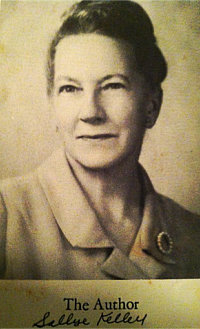 My father’s first cousin Sally Kelley, whom I’ve mentioned in several previous blogs, was a very intelligent published writer and poet. She used to talk about something she called “impossible fiction.” This she explained to my youthful, inquiring mind was a situation that is true but if you tried to pass it off as fiction, most editors would nix your submission as being “impossible fiction.. Sarah Palin’s pronouncements and verbal strip tease the other day certainly fit the bill as Sally’s description had been pointed out to me lo those many years ago.
My father’s first cousin Sally Kelley, whom I’ve mentioned in several previous blogs, was a very intelligent published writer and poet. She used to talk about something she called “impossible fiction.” This she explained to my youthful, inquiring mind was a situation that is true but if you tried to pass it off as fiction, most editors would nix your submission as being “impossible fiction.. Sarah Palin’s pronouncements and verbal strip tease the other day certainly fit the bill as Sally’s description had been pointed out to me lo those many years ago.
The problem is that the viewing from my TV couch doesn’t stop with Sarah. The following day Glenn Beck came out for Ted Cruz and he sounded like he might have just landed on Earth from the planet Xenophobia. Then yesterday two ministers, one for Donny and one for Teddy, hit the limit in their talk about the anti-Christ being Oprah and that Hitler had been sent here by Christ to deal with the Jewish problem.
Am I dreaming? Is this “impossible fiction” getting out of hand? From my TV couch, I’d say we have entered some far-out region where Truth is fiction and Fiction is truth. I must say though that this is not an all-together new phenomenon for me. A few years back, I wrote a book called VIVA LA EVOLUCION. Even though the title is in Spanish, the book is in English and in it I tried to write the most outrageous, impossible fiction I could. I’d say though that my outlandishness in this particular book is nothing compared to what I’m seeing daily on TV from my recovery couch.
In order that you might see how impossible fiction works, I’d like to present to you a few brief paragraphs from my book VIVA LA EVOLUCION. If you, like me, are intrigued by how our political system has shot into some outrageous purgatory at the moment, you might like to read VIVA LA EVOLUION. It pulls no punches and presently makes our reality look worse than impossible fiction. I can only shake my head in amazement.
Here are those paragraphs from VIVIA LA EVOLUCION:
 In a state of confusion, everyone looked at Alex except Abby. She knew the drill even if they didn’t.
In a state of confusion, everyone looked at Alex except Abby. She knew the drill even if they didn’t.
“What is wrong?” said Dr. Reichler with alarm.
Alex walked over to Trudy and asked her, “Was this punch and lemonade made with tap water—and those ice cubes?”
She gave him an innocent smile and replied, “Yes, like I always do.”
Dr. Botsford took a cup and poured himself a glass of the red punch over several ice cubes. “I can vouch that Trudy’s punch gets five stars by me.”
He toasted Trudy and put the cup to his lips. Others quickly followed suit. Alex watched in horror.
“Please, I beg of you not to drink this punch and lemonade and don’t use those ice cubes,” said Alex precisely.
“Could I be so forward as to ask why?” asked Dr. Botsford as though he had had quite enough of Alex.
“Because I’m convinced tap water has an additive that will dim one’s mental capacity—especially here in Washington D. C.,” Alex said, trying to be as convincing as possible.
“Oh, I don’t think it’s the water,” said Dr. Pearlmutter with one of his small smiles. “If anything is dimming people’s minds it’s TV.”
“It all amounts to the same thing,” said Alex. “You actually just proved my point, Dr. Pearlmutter. The size of a person’s brain is decreasing these days. My mentor in the project I’m undertaking, Professor Poniotofsky, the Polish behavioral scientist I cited so much in my work, was the first to discover this phenomenon.”
Dr. Chestermire looked at Alex and said candidly, “Young man, I don’t notice people’s heads changing sizes.”
“And you won’t,” said Alex. “All of this is explained in my program notes that I included with my proposal—the part, Dr. Botsford, which you called fine print. Professor Poniotofsky in his studies found that the cortex of an average human if unraveled would be the size of a tablecloth, while a gorilla’s would be handkerchief size. It is the cortex which is diminishing in size—not the head itself.”
Dr. Botsford breathed out as though he were losing his patience, “What has all that got to do with whether we drink Trudy’s punch or not?”
Everybody looked at Alex as if he were a bona fide crackpot. Again Dr. Botsford put the cup to his lips as though it were an act of defiance.
Alex stood his ground and said, “As I stated in the conference room earlier, I am convinced that we are returning to the Neotony of a gorilla due to the tap water we are drinking—and especially here in Washington D. C. That is why I am against your drinking tap water.”
“You actually think if I drink this punch, I am going to turn into a gorilla?” asked Dr. Botsford with a testy smirk.
“No, not immediately,” answered Alex, “but over time, your cortex will shrink and you will take on simian characteristics mentally and culturally. After much study, Dr. Poniotofsky established the proof that you can actually shrink a man’s cortex via a formulated elixir. If you were to add that elixir to someone’s water, that person would eventually become dumb, stupid and vapid.”
Viva La Evolucion by Jack Fitzgerald, 2009.
January 21, 2016
Southern English
Recently when I was in the hospital I said something to one of the nurses and she responded to me in a sweet, syrupy voice: “Where y’all from , honey?”
I may have been somewhat sedated at the time but I do remember that as nice as the nurse was, she thought she was being very friendly to pose her question in this manner to me. This identical question has been hurled my way for the last 70 years of my life.
The answer is always the same on my part: I was born in Alabama and grew up in Mississippi but haven’t lived there for over 60 years. To most people I sound like I am from California but a couple of vowels betray my true origin. So, I just go along with it. However the one part of the nurse’s statement that got some direct comment was her lack of proper Southern grammar. You see, when you are talking to one person in the south,, you say “you” like anywhere else.; however, when you are talking to two or more Southerners,, you will say y’all or you all. It really does rattle a true Southerner to hear you all or y’all used to just one person. It sounds pretentious and unlearned to us. I always correct people on that little bit of Southern grammar. Adding the”honey”, just makes it a little more obvious that I am being played with. So, when she said ”Where ya’ll from, honey?”, I just shook my head a bit and went back to medication land.
When I was growing up in Mississippi, most Southerners did sound like Huckleberry Hound. I’m sure when I was a teen, I was the same. Many older people still have a deep Southern drawl and are proud of it. I think it is charming and I can well remember friends and family members who fit in this category and I remember them fondly. A true Southern Drawl always sounded friendly and charming to me.
Over the years things have changed in the South though. Most young Southerners these days sound like they are from Pennsylvania. They don’t have even a tinge of a Southern drawl. I suppose this is due to the far-reaching influence of TV and Films. My nieces and nephews of the present generation do not sound Southern at all. The deep drawl of their past has gone the way of the dodo bird.
My brother’s children grew up in Lafayette, Louisiana, an area which is deep in the heart of Cajun territory. Most people in the area used to speak Cajun French and had a very pronounced Cajun accent when speaking English. I loved hearing it spoken and many Cajun comedians came from their midst. ( Justin Wilson, for example. Check him out on You Tube.)
I suppose though that like all things in life, change takes place in language whether we like it or not. The Cajun accent and the speaking of Cajun French is flying with the dodo birds these days.
 New Orleans is a different kettle of fish. Even though they have the fabled and famed French Quarter, it would be very difficult to put a cap on what exact accent is spoken in this fabulous city. The last time I was in New Orleans a couple of years back, I strolled around and listened to the sights and sounds of the city. Some people sounded like they were from New York, some had a definite Creole laid-back sound in their speech and others had a kind of sophisticated Southern drawl like Emeril Lagasse, the famed New Orleans restaurateur. (Perhaps his local accent is acquired being that he is originally from Massachusetts.) New Orleans though is truly a mixed bag when it comes to the spoken language.
New Orleans is a different kettle of fish. Even though they have the fabled and famed French Quarter, it would be very difficult to put a cap on what exact accent is spoken in this fabulous city. The last time I was in New Orleans a couple of years back, I strolled around and listened to the sights and sounds of the city. Some people sounded like they were from New York, some had a definite Creole laid-back sound in their speech and others had a kind of sophisticated Southern drawl like Emeril Lagasse, the famed New Orleans restaurateur. (Perhaps his local accent is acquired being that he is originally from Massachusetts.) New Orleans though is truly a mixed bag when it comes to the spoken language.
 The Southern part of Louisiana is water-logged for the most part and these areas are called bayous. The language spoken in the Bayous used to be Cajun (Arcadian) French predominantly. Those hidden waterways which were so concealed from the everyday world and filled with gators and snakes and lots of wild game were a way of life for many people. They were a tough group who spoke their special brand of French and lived in very isolated communities and situations.
The Southern part of Louisiana is water-logged for the most part and these areas are called bayous. The language spoken in the Bayous used to be Cajun (Arcadian) French predominantly. Those hidden waterways which were so concealed from the everyday world and filled with gators and snakes and lots of wild game were a way of life for many people. They were a tough group who spoke their special brand of French and lived in very isolated communities and situations.
Today the young people in those areas are leaving and no longer speaking their special brand of French. For the most part, they are abandoning their past and moving on to more fertile areas such as New Orleans, the big cities of Texas, northern dry Louisiana and many even move to California.
You can go these days into the bayou country of Southern Louisiana and you will still encounter some of these hard-living people but nowadays they speak English with peppered French expressions and the Cajun accent is not as predominant as it used to be.
Their music has become popular and thus many Cajun and Zydeco bands have sprouted up all over Louisiana and elsewhere in the south. This type of music is a blues-influenced style of Cajun dance music and usually played on accordion, guitar, and violin. The origin of zydeco is heavily tied into the Louisiana French roots.
 Along with this unique music are crawfish (some say crayfish) boils in which big pots of these miniature lobsters are boiled and eaten by pinching them with the fingers. It’s all part of a special Southern charm and many young people (including my nephew in Los Angeles and his friend Colin) hold on to crawfish boils and Zydeco music. John, Colin and their friends have many New Orleans and Cajun get togethers at their homes in Los Angeles and as they say in their best Cajun French: “Laissez les bons temps rouler.” French for “Let the good times roll.”
Along with this unique music are crawfish (some say crayfish) boils in which big pots of these miniature lobsters are boiled and eaten by pinching them with the fingers. It’s all part of a special Southern charm and many young people (including my nephew in Los Angeles and his friend Colin) hold on to crawfish boils and Zydeco music. John, Colin and their friends have many New Orleans and Cajun get togethers at their homes in Los Angeles and as they say in their best Cajun French: “Laissez les bons temps rouler.” French for “Let the good times roll.”
Southern dialects can change from state to state but these dialects are having to hold on to their heritage for dear life. So, when a nurse asks in a friendly way, “Where y’all from, honey?”, I guess the proper response (especially if you’re flat on your back in a hospital) is to be glad that the nurse was interested enough even to ask the question.
January 7, 2016
The Land of Jack
The simple answer is I have been very injured for the last couple of weeks. Injury is not the thing of which fun blogs are constructed but, nevertheless, injury is one of the facts of life we must sometimes face.
I could go into detail concerning my injury but I can guarantee you that none of it would sound like the Jack you know from his blog. Let’s just say that I am back and that I am on the rebound.
So bear with me as I return to the land of Jack and once again look at life from its many intriguing angles. I promise a minimum of hospital stories. Of course, I can’t for certain say I won’t pass along to you some of the funnier side of being ill but that is just the way I am built.
I’m back and I’d love to hear from you. My very best wishes for a wonderful 2016 and I’ll do my best to stick around and provide you with some more Jack blogs.
Cheers. Your friend and colleague.
(Note: When this blog entry was first posted, I inadvertently used my name as the author. Jack is the author. Sorry for the confusion. Dan)
November 18, 2015
ENCORE: Experience is the Best Teacher

(Editor Note: Jack has been a bit under the weather for awhile. All is okay, but he asked that we run an Encore for the Nov 19th blog. All the Comments are still read. Thanks. Dan)
(Original publication June 26, 2014)
In one of my past blogs several months back, I wrote about incorporating your life experiences into your writing. I have found over the years that a lot of writers block comes about because the writer has not planned out his or her story ahead of time. This can be done by not biting off more than you can chew for one thing. In other words, keep in control of your plot. Don’t try to write the history of the world in one book. Writer’s block occurs when your plot (or whatever it is you want to say) gets in charge of you.
The best way to stay in control of your plot is to write from personal experience. That goes hand in hand with telling the truth. If you stick with the facts, you’ll never be caught in an unwieldy set of circumstances. You merely just repeat the truth and it never changes. The same with your plot. If you stick with your experiences, you won’t get lost.
Of course sometimes you will encounter certain areas in which you will have to do vast research to fake a certain experience. In my book Contessa, I had the main character spending the day in Bridgeport, Connecticut, at the Barnum Museum. In all actuality, I have never set foot in that city or the museum. I did a great deal of research and managed to get through that part of the plot rather tolerably. However, I simply couldn’t do that with an entire book. It would lack truthfulness, frankness and intimacy.
If you have read my blogs over the last few weeks, you will have relived with me many of my actual army experiences of years ago. You will have read about my getting to the island of Okinawa and some of the various adventures I had while serving in the military there. I used a great many of those incidents in my book Contessa. Below you will see two brief passages from Contessa which are based on actual experiences of mine. What if I had not had those real experiences but tried fabricating them? For sure the book would have lacked the freshness of realism. Compare these two passages below with their counterparts in my autobiographical blogs of the past three weeks.
TROOP SHIP BLOG: (Excerpt from Contessa)
In the meantime, Rico and Harvey came through with some extremely important tips for me. Rico said,
“Run like hell to board the troopship. Try to be among the first—and you will if you don’t loaf around like the dawdlers who hate the thought of leaving the U. S. A. Take your duffel bag and run like hell down to the sleeping quarters in the bowels of the ship. The bunks are six high. There are no mattresses—just some canvas looped with rope onto a rectangular pipe frame. You’ll have a pillow and a blanket. Hoist your duffel bag up to the top bunk—I mean the absolute top one.”
Harvey added, “Again run like hell and try to find the Chaplain’s office. Some crew member will be able to tell you where it is. Find him and tell him you have all sorts of experience working in the library.”
“But that’s true,” I said.
“So much the better. Beg him—get down on your knees and pray—do anything you can to get to work in that library.”
“And then make sure,” Rico jumped in, “that you don’t watch the movies on deck at night and for goodness sake don’t look down at the boat plowing through the water.”
HABU! HABU! BLOG: (Excerpt from Contessa)
 Mind you in addition to that village being quiet as a tomb at night, it had no streetlights. I went to the edge of the village and waited on the side of the road for the bus. The moon was full and it was a lovely tropical evening. In those days, I smoked cigarettes. (A habit I’d picked up soon after my arrival on Okinawa.) My tendency was to light a cigarette and somehow I thought that helped make the bus hurry up and arrive.
Mind you in addition to that village being quiet as a tomb at night, it had no streetlights. I went to the edge of the village and waited on the side of the road for the bus. The moon was full and it was a lovely tropical evening. In those days, I smoked cigarettes. (A habit I’d picked up soon after my arrival on Okinawa.) My tendency was to light a cigarette and somehow I thought that helped make the bus hurry up and arrive.
My mind was in Jericho as I puffed away. All of a sudden, I noticed what I thought was a leaf floating about three feet from the ground. The only problem was the leaf just floated and floated and never landed. I thought how strange—and even stranger, there wasn’t a breath of a breeze. All of a sudden it came to me. What I erroneously thought was a floating leaf was in all reality the moonlight reflecting off the hood of a snake. A habu was standing right before me and was following the red ash of my cigarette. I was in super panic. The only thing I knew to do was stand still and as loudly but in as controlled a manner as possible say, “Habu! Habu! Habu!”
I was hoping and praying that one of the natives in the closest hut would hear me. After what seemed like an eternity, a door opened and I heard a scurrying sound. The people had let out their mongoose on a long line. It made a direct dash for that habu and instantly tore its mouth to shreds. I went limp. I thanked the people. They reeled back in their mongoose, the bus came, and I got on it.
These two examples show how I used experiences from my real life in a book of fiction which I wrote. So, actually a lot of fiction is really real life in essence. It’s certainly a way to keep your plot well oiled and working smoothly.
NOTICE: The next four blogs will come to you from Paris, France, where I will be spending most of the month of July. I lived there 10 years and it is where I began my career as a writer. I will be sharing with you some of my favorite tips about Paris.
October 29, 2015
I’ll See You In C-U-B-A
Cuba is very much in the headlines these days. If things keep progressing as they have over the last six months, tourism will open up on an unlimited scale soon. As it is at the moment, going to this nearby island nation is limited to participants in cultural, educational, athletic and humanitarian projects. Recently close relatives have been added to the groups allowed to visit the country. Even so, people qualifying for entry are subject to rather expensive tour prices. One will pay over $3,000 for a week’s stay including airfare from Miami, your hotel and certain meals. This is per person on a double occupancy basis. For half this price, one can have a deluxe cruise or land tour to other countries and stay for twice the time. In other words, going to Cuba at the moment is subject to restrictions and is very expensive.
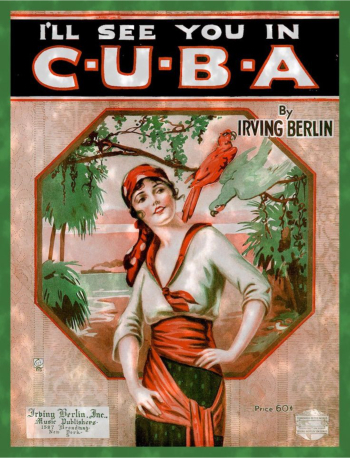 A popular song of the 1920s was “I’ll See You in C-U-B-A,” written by Irving Berlin. (Look it up on you tube. The original version is by a popular singer of the time named Billy Murray.) The opening lines are:
A popular song of the 1920s was “I’ll See You in C-U-B-A,” written by Irving Berlin. (Look it up on you tube. The original version is by a popular singer of the time named Billy Murray.) The opening lines are:
“Not so far from here
There’s a very lively atmosphere.
Everybody’s going there this year
And the reason’s very clear.
The season opened last July,
Ever since the U. S.A. went dry.
Everybody’s going there and I’m going too.
I’m on my way to Cuba.
I’ll see you in C-U-B-A!”
Here in the U.S.A., our puritanical heritage got the best of us in the early 1920s and organized religion managed to get laws passed enacting the prohibition of the sale of liquor, gambling and sex. Not to worry though because rum-running became widespread and organized crime took control of the distribution of alcohol. Chicago became notorious as a haven for prohibition dodgers during the time that became known as The Roaring Twenties.”
 Meanwhile Cuba, located just 90 miles off the coast of Florida quickly became a marketplace for booze, gambling and sex. The puritans could go there for next to nothing and eat, drink and be merry all they wanted. They then could return to their hometowns and sing in the church choir on Sunday. Big time mafia people and crime lords took control of the island and soon Cuba gained the reputation of being the U. S.A.’s dumpster for sin.
Meanwhile Cuba, located just 90 miles off the coast of Florida quickly became a marketplace for booze, gambling and sex. The puritans could go there for next to nothing and eat, drink and be merry all they wanted. They then could return to their hometowns and sing in the church choir on Sunday. Big time mafia people and crime lords took control of the island and soon Cuba gained the reputation of being the U. S.A.’s dumpster for sin.
Prohibition was a gigantic flop in its intention to purify the U.S.A. The anti-sin laws came to an end in the late 20s or early 30s but in portions of the Bible belt of the country, the ban on alcohol, prostitution and gambling lasted well into the sixties.
Cuba meanwhile continued being the place to go for every conceivable vice. Bars and whore houses in Havana like Sloppy Joe’s became infamous. Casinos flourished and brought tons of tourists in to feed the one-arm bandits and gambling tables. The nation was governed by dictator Colonel Fulgencio Bautista, who ran Cuba, they say, from poolside at the fabulous Hotel Nacional in Havana. He received all his orders from the American mafia and crime lords who in effect controlled the island.
 In 1958 Fidel Castro came into power with a revolution that sent all these American mafia people running to Las Vegas to set up shop and peddle their wares. The problem was that Cuba swapped the devil for the witch. Castro put himself into the hands of the Soviet Union and turned the island into a Communist bastion. There he still sits today even though he has recently put his younger brother Raul in charge of things. The brothers Castro are still trying to keep Communism alive but managing only by the skin of their teeth.
In 1958 Fidel Castro came into power with a revolution that sent all these American mafia people running to Las Vegas to set up shop and peddle their wares. The problem was that Cuba swapped the devil for the witch. Castro put himself into the hands of the Soviet Union and turned the island into a Communist bastion. There he still sits today even though he has recently put his younger brother Raul in charge of things. The brothers Castro are still trying to keep Communism alive but managing only by the skin of their teeth.
A few months back President Obama participated in a face-to-face dialogue with Raul Castrol for the opening up of Cuba. Things began to happen very fast. For the first time in over fifty years, embassies of both nations were opened. For a while there, it looked like Cuba was on the very gateway of rejoining the world. One would think the opening up of this island nation would more or less happen overnight. Not so, unfortunately. The Republicans are totally against it, especially Marco Rubio who is of Cuban heritage. Most Cubans in Florida are dead set against letting the Castro brothers open up their borders. They figure that such an event would legitimize the Castros and Communism. On the other hand, a faction of the die-hard Communists in Cuba are dead set against opening up the island too. They fear their loss of power. So, at the moment it is a battle of egos. Once both sides soften their positions, perhaps Cuba will see a new updated version of “I’ll See You in C-U-B-A” being sung.
When the casinos re-open in Havana and the night life kicks back in, the tourist industry will take charge once again and folks by the tons will begin arriving. No longer will those three-thousand dollar a week tours be the only route to get there. Prices will drop dramatically once good ole capitalism springs back on the scene. The island in short order will become a new hybrid Disneyland-Las Vegas.
When I went to live in Cuba in 1950s, I could fly one-way from Florida to Havana for ten dollars. Ferry boats were making the trip for seven dollars. Inexpensive hotels and food were widely available and loads of tourist streamed in daily. This will happen again but I don’t suspect that Cuba will become sordid like it was before Castro. As I said, I suspect it will become a hybrid Las Vegas-Disneyland.
Here is a bit of information for those who wonder what the whole uproar concerning Cuba is all about. Why should people care? The answer is a simple one. The island has a great winter climate which snowbirds love. The place is uniquely different from Mexico’s Indian heritage and taco leaning cuisine. Cuba is distinctly European in culture and food. It is like a living, ongoing Broadway musical any time of the day.
 In the pre-Castro days, Cuba was a one-city country—namely Havana. Once the island re-opens for business, every nook and cranny of this beautiful nation will be opened up by the tourist industry.
In the pre-Castro days, Cuba was a one-city country—namely Havana. Once the island re-opens for business, every nook and cranny of this beautiful nation will be opened up by the tourist industry.
Benjamin Franklin had a maxim that stated: “Either write something worth reading or do something worth writing.” I did both I think by going to live in Cuba in the fifties. Most of my adventures there during the revolution are recounted in my book CONTESSA. I think if you read it, you will see why Cuba deserves a second life.
So, I’ll See You In C-U-B-A!
(My next blog post will be November 19th, 2015)
October 22, 2015
Politics in the Movies
When an author is thinking of writing a novel or a screenplay, he or she usually digs for a theme that will interest an audience. The possibilities are endless as you can well imagine.
Here’s a suggestion. Politics can be a gold mine for the savvy writer. With the 2016 elections looming in the foreseeable future, you might like to think of writing something with a political theme.
Most countries have short political cycles for electing a national leader. In Australia it’s something like six weeks. Here in the USA it’s something like eighteen months if not two years. As I write this, we are still over a year away from the next presidential election. In that amount of time, you should be able to come up with a plot of some sort related to the political scene.
Films about politics come in all stripes. They can examine our greatest ideals or our worst fears. When one writes about politics, one is actually writing about power. Political stories all involve the basic elements of human character, integrity, morality, honesty—or, of course, the complete lack of any of those traits.
Politics is an awfully touchy subject because it involves people’s core concepts and beliefs on how an area or nation should be run, how its citizens should be treated and who’s fit to control all of it. One of the basic themes within the area of politics is the focusing on people in power or would-be power. Are they the most-qualified or the most moral or the most law-abiding? These are chief ingredients for any political film or novel.
I present here a list of a dozen political films that I have enjoyed over the years. They to me encapsulate an examination of the subject of politics. Some are old and some are more recent but they all show that the basic game in politics doesn’t change. You might like to see these films again or see them for the first time. Perhaps they will give you some inspiration for writing your own politically based screenplay or novel. At any rate, it’s the political season and that might spell opportunity for you if you’re searching for a theme. I hope you enjoy these films as much as I have.
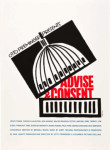 1. Advise and Consent: Senate investigation into the President’s newly nominated Secretary of State, gives light to a secret from the past, which may not only ruin the candidate but the President’s character as well.
1. Advise and Consent: Senate investigation into the President’s newly nominated Secretary of State, gives light to a secret from the past, which may not only ruin the candidate but the President’s character as well.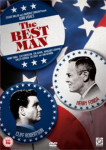 2. The Best Man: Set in a political convention, this film explores the two extremes of stereotypical politicians—the dirty one who does whatever it takes to win (Cliff Robertson), and the one who relies on integrity and respectful tactics (Henry Fonda). Gore Vidal wrote this film that contains deplorable political maneuvers, infidelity and attacks on personal lives. It shows that even 50 years ago, politics were just as nasty as they are now (although people smoked a lot more).
2. The Best Man: Set in a political convention, this film explores the two extremes of stereotypical politicians—the dirty one who does whatever it takes to win (Cliff Robertson), and the one who relies on integrity and respectful tactics (Henry Fonda). Gore Vidal wrote this film that contains deplorable political maneuvers, infidelity and attacks on personal lives. It shows that even 50 years ago, politics were just as nasty as they are now (although people smoked a lot more).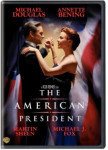 3. The American President: (1995) Starring Michael Douglas and Annette Bening. Against the advice of his aides, a widower president decides to start dating in the middle of an election year. The object of his affection just happens to be lobbying for legislation he doesn’t want. Witty dialogue, and a great behind-the-scenes look at the White House.
3. The American President: (1995) Starring Michael Douglas and Annette Bening. Against the advice of his aides, a widower president decides to start dating in the middle of an election year. The object of his affection just happens to be lobbying for legislation he doesn’t want. Witty dialogue, and a great behind-the-scenes look at the White House. 4. The Candidate: Robert Redford plays a lawyer from California, Bill McKay, who’s recruited to run for the U. S. Senate. The problem is he doesn’t actually believe he’ll win (and he doesn’t really care.) Although McKay is inexperienced, he learns to garner goodwill—and votes—by using charismatic honesty. But eventually, the prospect of winning is too appealing, and he begins playing underhanded political games.
4. The Candidate: Robert Redford plays a lawyer from California, Bill McKay, who’s recruited to run for the U. S. Senate. The problem is he doesn’t actually believe he’ll win (and he doesn’t really care.) Although McKay is inexperienced, he learns to garner goodwill—and votes—by using charismatic honesty. But eventually, the prospect of winning is too appealing, and he begins playing underhanded political games.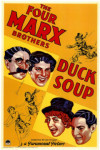 5. Duck Soup: Rufus T. Firefly is named president/dictator of bankrupt Freedonia and declares war on neighboring Sylvania over the love of wealthy Mrs. Teasdale (the remarkable Margret Dumont.) Political farce. (1933 with the Marx Brothers.)
5. Duck Soup: Rufus T. Firefly is named president/dictator of bankrupt Freedonia and declares war on neighboring Sylvania over the love of wealthy Mrs. Teasdale (the remarkable Margret Dumont.) Political farce. (1933 with the Marx Brothers.)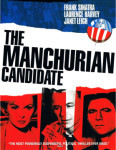 6. The Manchurian Candidate: Eerie, shocking, daring, thrilling and mesmerizing, The Manchurian Candidate will leave you breathless. Featuring an all-star cast, including Angela Lansbury in an Oscar-nominated performance, this chilling and controversial film may be the most sophisticated political satire ever made. When a platoon of Korean War G.I.s is captured, they somehow end up at a ladies garden club party. Or do they? Major Bennett Marco (Frank Sinatra) can’t remember. As he searches for the answer, he discovers threads of a diabolical plot orchestrated by the utterly ruthless Mrs. Iselin (Lansbury) and involving her war hero son (Laurence Harvey), her worthless senator husband (James Gregory) and a secret cabal of enemy leaders.
6. The Manchurian Candidate: Eerie, shocking, daring, thrilling and mesmerizing, The Manchurian Candidate will leave you breathless. Featuring an all-star cast, including Angela Lansbury in an Oscar-nominated performance, this chilling and controversial film may be the most sophisticated political satire ever made. When a platoon of Korean War G.I.s is captured, they somehow end up at a ladies garden club party. Or do they? Major Bennett Marco (Frank Sinatra) can’t remember. As he searches for the answer, he discovers threads of a diabolical plot orchestrated by the utterly ruthless Mrs. Iselin (Lansbury) and involving her war hero son (Laurence Harvey), her worthless senator husband (James Gregory) and a secret cabal of enemy leaders.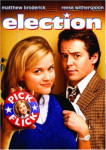 7. Election: Okay, so it’s not a film about governmental politics, but what better setting for political satire than a high school? Tracy Flick (Reese Witherspoon) is running for head of student council. Civics teacher Jim McAllister (Matthew Broderick) despises her and desperately wants to derail her progress, so he convinces football player (Chris Klein) to run against her. Shallow, power-hungry, selfish people do whatever it takes to get their way, including destroying others, proving that high school and politics are scarily similar (and frequently funny.)
7. Election: Okay, so it’s not a film about governmental politics, but what better setting for political satire than a high school? Tracy Flick (Reese Witherspoon) is running for head of student council. Civics teacher Jim McAllister (Matthew Broderick) despises her and desperately wants to derail her progress, so he convinces football player (Chris Klein) to run against her. Shallow, power-hungry, selfish people do whatever it takes to get their way, including destroying others, proving that high school and politics are scarily similar (and frequently funny.)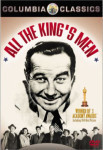 8. All The King’s Men: Broderick Crawford plays Willie Stark, a Southern lawyer who has grand ideas for helping his state but no political experience. The opposition hires him to simply split the vote, but he wins, retains power, and (from his perspective) makes everything better — by toying with populist emotions and engaging in illegal, corrupt, and immoral behavior. It’s an engrossing look at the malignant influence of power and ambition, and how their acquisition often impels disreputable actions.
8. All The King’s Men: Broderick Crawford plays Willie Stark, a Southern lawyer who has grand ideas for helping his state but no political experience. The opposition hires him to simply split the vote, but he wins, retains power, and (from his perspective) makes everything better — by toying with populist emotions and engaging in illegal, corrupt, and immoral behavior. It’s an engrossing look at the malignant influence of power and ambition, and how their acquisition often impels disreputable actions.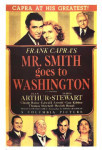 9. Mr. Smith Goes To Washington: This film chronicles the tale of Jefferson Smith (Jimmy Stewart.) He’s the leader of a boy-scout troop before being recruited to the Senate by a team that believes he’ll do whatever he’s told—specifically, allow the building of a dam that will make said team rich. Unlike Willie Stark in All The King’s Men, the main character isn’t corrupted by politics. Rather he defies and decries the corruption. Mr. Smith has major sentimental overtones and a desire for an ideal world. Never has a political theme had such old-fashion, feel-good moments. Stewart’s character displays a fortitude and integrity we wish all politicians had. It’s old, but it’s still incredibly good.
9. Mr. Smith Goes To Washington: This film chronicles the tale of Jefferson Smith (Jimmy Stewart.) He’s the leader of a boy-scout troop before being recruited to the Senate by a team that believes he’ll do whatever he’s told—specifically, allow the building of a dam that will make said team rich. Unlike Willie Stark in All The King’s Men, the main character isn’t corrupted by politics. Rather he defies and decries the corruption. Mr. Smith has major sentimental overtones and a desire for an ideal world. Never has a political theme had such old-fashion, feel-good moments. Stewart’s character displays a fortitude and integrity we wish all politicians had. It’s old, but it’s still incredibly good. 10. Seven Days in May: The story of a nearly successful military takeover of the U.S. government, Seven Days in May was scripted by Twilight Zone creator Rod Serling. This means the viewer is in for an exceptional political thriller. The movie’s strengths include a brilliant cast (Kirk Douglas, Burt Lancaster, Ava Gardner, Fredric March) and director John Frankenheimer’s taut pacing of this scarily credible plot. When, near the end of the film, Douglas’s character, a career military man, finally confronts his one-time hero and now proven traitor, Gen. James Mattoon Scott (Lancaster), the macho tension between the two superstars is staggering.
10. Seven Days in May: The story of a nearly successful military takeover of the U.S. government, Seven Days in May was scripted by Twilight Zone creator Rod Serling. This means the viewer is in for an exceptional political thriller. The movie’s strengths include a brilliant cast (Kirk Douglas, Burt Lancaster, Ava Gardner, Fredric March) and director John Frankenheimer’s taut pacing of this scarily credible plot. When, near the end of the film, Douglas’s character, a career military man, finally confronts his one-time hero and now proven traitor, Gen. James Mattoon Scott (Lancaster), the macho tension between the two superstars is staggering. 11. All The President’s Men: This masterful drama about the downfall of President Richard Nixon features a slew of great American actors — Robert Redford, Dustin Hoffman, Jason Robards and Jack Warden. The real star here is director Alan J. Pakula, who manages to invest what might have been an ordinary media tale of reporters Bob Woodward (Redford) and Carl Bernstein (Hoffman) into a most thoughtful thriller.
11. All The President’s Men: This masterful drama about the downfall of President Richard Nixon features a slew of great American actors — Robert Redford, Dustin Hoffman, Jason Robards and Jack Warden. The real star here is director Alan J. Pakula, who manages to invest what might have been an ordinary media tale of reporters Bob Woodward (Redford) and Carl Bernstein (Hoffman) into a most thoughtful thriller.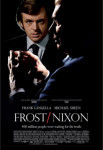 12. Frost/Nixon: A master class in intelligent acting, Frost/Nixon recreates the famous televised battle of wits between the disgraced former President Nixon, hoping to somehow rehabilitate his destroyed public image, and a British “celebrity” interviewer intent on making a name for himself in the States as a provocative reporter. Both men were more or less successful in their aims — but Ron Howard’s film finds high drama and political intrigue in the unexpectedly dynamics between these two very different men. Michael Sheen plays Frost as a suave terrier after the truth, while Frank Langella is more like a wary pit bull who is testy and intimidating.
12. Frost/Nixon: A master class in intelligent acting, Frost/Nixon recreates the famous televised battle of wits between the disgraced former President Nixon, hoping to somehow rehabilitate his destroyed public image, and a British “celebrity” interviewer intent on making a name for himself in the States as a provocative reporter. Both men were more or less successful in their aims — but Ron Howard’s film finds high drama and political intrigue in the unexpectedly dynamics between these two very different men. Michael Sheen plays Frost as a suave terrier after the truth, while Frank Langella is more like a wary pit bull who is testy and intimidating.Now, what is your political novel or screenplay going to be about? In any case, good luck and good writing!
October 15, 2015
ENCORE: The Writing Hat Trick
Many, many people with whom I‘ve been in contact during my adult life have expressed the desire to write a book. Many of them have been told after several drinks during a highly charged round of chit chat, “You should write a book.” The person receiving such words really feels pumped up until they actually try to start putting words down on a blank page or screen. They perhaps will get a couple of pages written, stop and never pick up on their thoughts again. Then on the other hand they might actually get going but soon run into something called “writer’s block”. This stuns their creativity in its tracks and their objective turns into a “work in progress”—an expression meaning “not going to happen”. All of their good intentions somehow fail to materialize. Their noble venture withers and dies on the vine.
A lot of people intend to write screenplays but the form and intricacies of the medium stymie them as much or more than writer’s block. I once had a woman send me her screenplay for script doctoring. She had no earthly idea how to write a screenplay. She had no coherence whatsoever because her story idea weighed a ton. She came to me, she said, because she had “writer’s block”. I did eventually work on her screenplay but doctoring on my part meant cutting out the fat on her idea by nearly 85%.
What’s wrong in all these cases? It’s not writer’s block. It’s the old hat trick. My father used to say, “Life is a hat trick. You reach in and pull out an idea and run with it.” He added, “The thinner the idea, the lighter the load.” He meant, of course, that the more specific you are in your plan, the lighter the load.
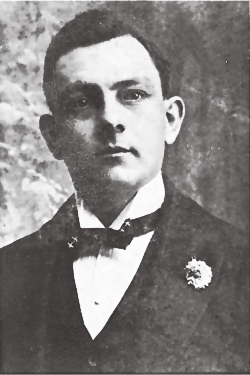
S. P. Howard
Take the case of my grandparents Lilly Rousseau and S. P. Howard. They led fantastic lives, which could serve as fodder for many books. If you tried to cram it all into one book, you would surely get “writer’s block”. Why? The idea load is too heavy and thus you will soon tire of it.
So, let’s do the old hat trick. Just reach into the writing hat and pull out one incident—that we will call the basic story line—treat it like a singular NOUN (for example, the noun marriage). Then add plot and treat it like a VERB—action via complications. Run with the two and I guarantee you won’t have writer’s block. It will be smooth sailing along your writing route.
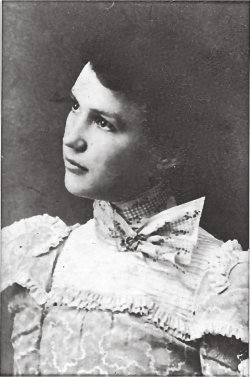
Lilly Rousseau
Okay, here’s a specific example from my own writing hat. Instead of reaching into the hat and pulling out the idea of “Recount the lives of Lilly and S. P.”, which weighs a ton, I reach in and pull out the much lighter idea of “How Lilly and S. P. met and married three days later.” With this lean of an idea for a book or a screenplay, I guarantee you won’t run into writer’s block.
Here’s why: You need to be able to tell your basic plot and story line in very few words. Two common methods for doing this are available: (1) A LOGLINE which is about 25 words or (2) A BRIEF SYNOPSIS which is 75 or so words. If you can do either or both of these easily with your project, you are definitely on the right track to doing away with writer’s block.
F or example :
LOGLINE: Young man in 1901 at his bachelor party accidentally meets his soul mate and surprises everyone by marrying her 3 days later.
BRIEF SYNOPSIS: S. P. who lives in San Antonio is going to get married to his business partner’s sister in 1901. His friends take him to Saint Louis for a bachelor’s farewell party. His fiancée tells him to buy her a wedding hat while there. The last day he goes to a fashionable French hat shop and who waits on him but a fabulously beautiful, young French lady by the name of Lilly Rousseau. Three days later they are married.
True story. Here I am, their grandson, writing their hat story for you. It’s the strangeness of life that intrigues us. We can only ferret out these surprises of life if we are specific in our original idea and try not to carry too heavy a load.
So, it’s the old hat trick, both literally and figuratively. Overcome writer’s block before you begin and you do that by making the NOUN and VERB of your project skinny.
Good writing.

